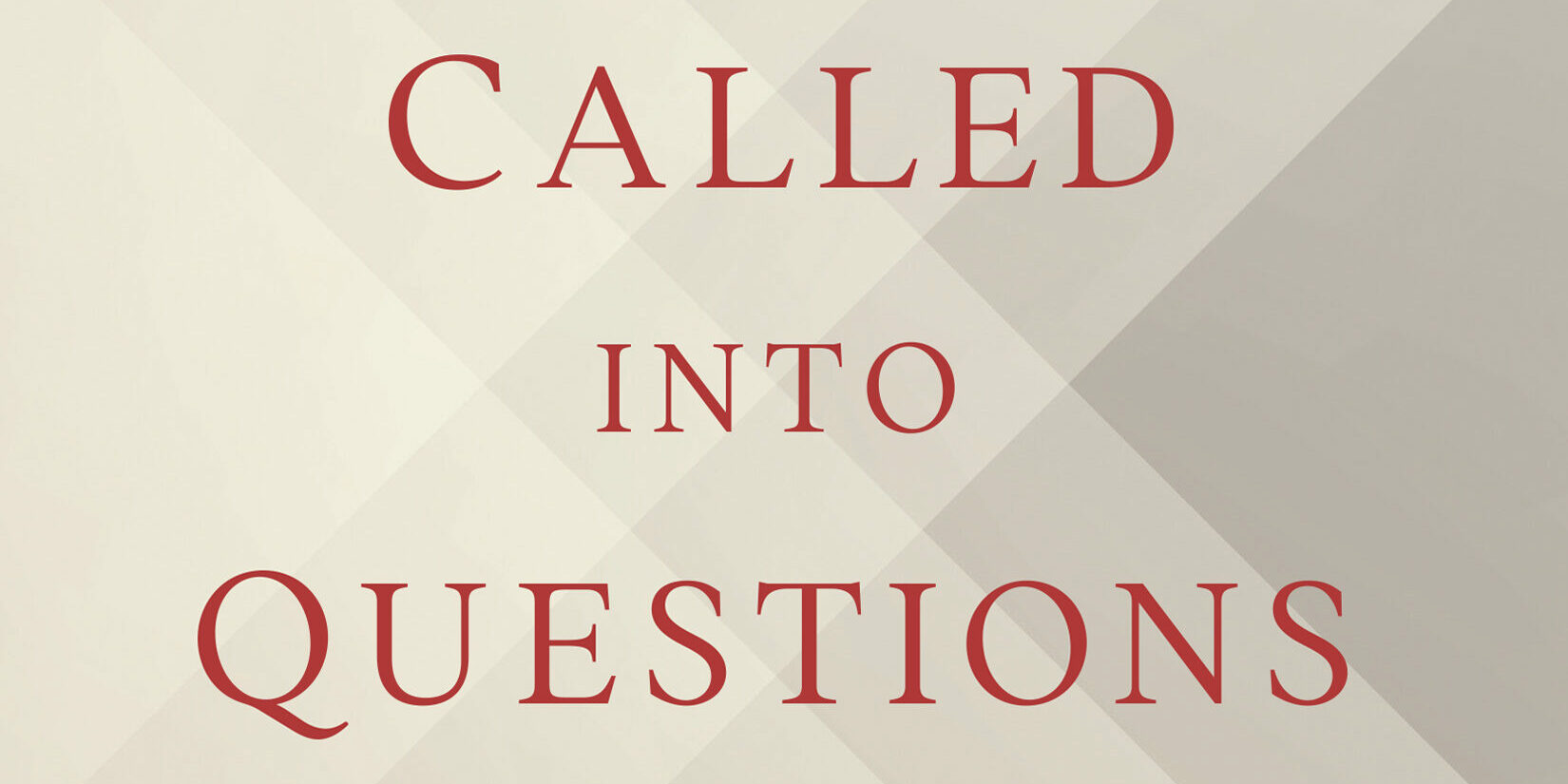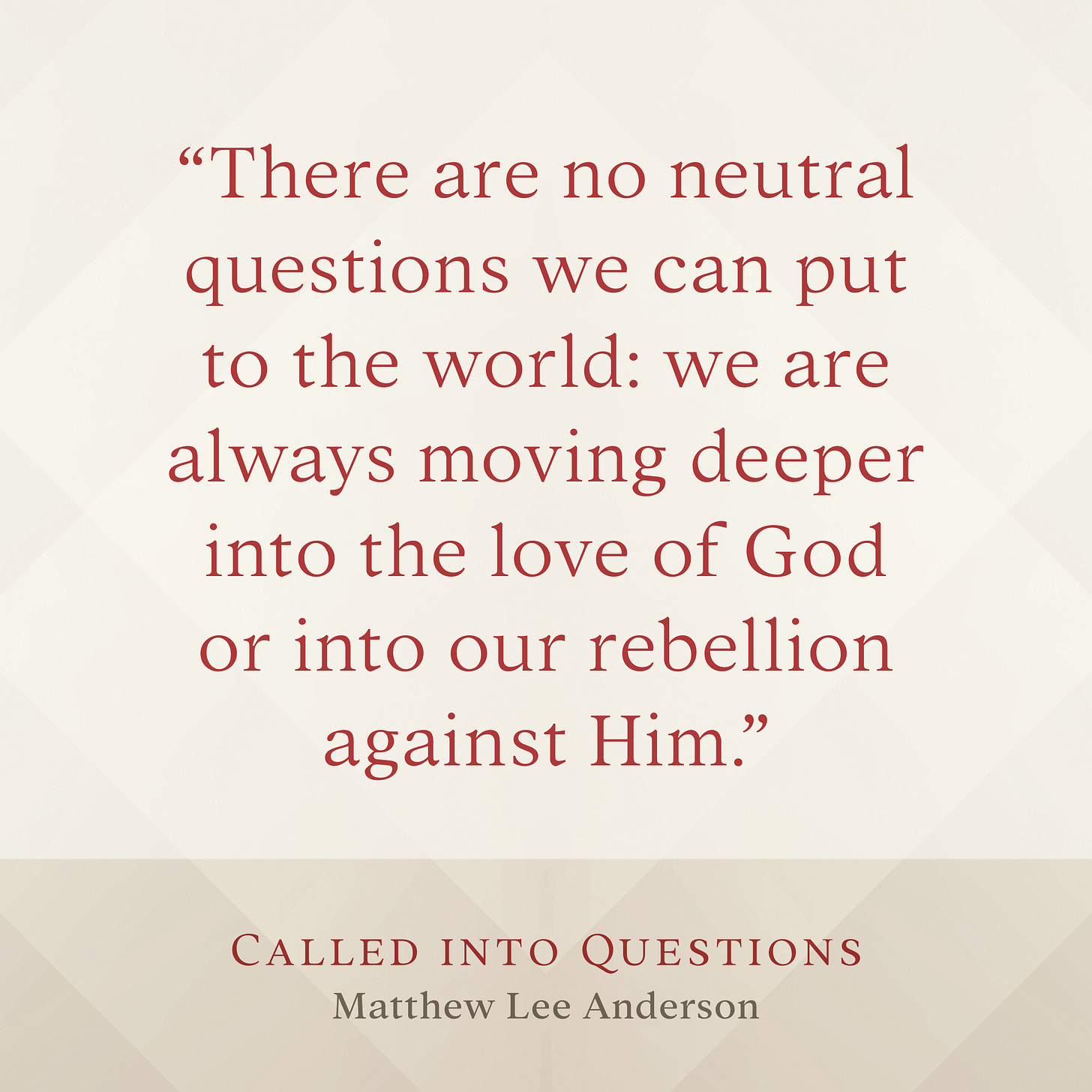The Called into Questions Interview

MLA: Called into Questions was released into the wild yesterday. I hope that you will buy a copy for yourself and a friend, read it, and then leave a review. The only way this book will reach an audience is through your generosity. Thank you.
To mark the occasion, I decided to subject myself to being questioned about it by my friend Brad East. Brad is one of the best young theologians around. He’s the author of several excellent books and his “blog” (yes, he still has one) is peppered with provocative thoughts. Even when Brad is wrong, I still enjoy reading him.
Enjoy the dialogue. (Warning: it’s long but, I hope, interesting!) And help me spread the word!

Brad: Tell me about the origins of this book. It’s a wholesale revision of a book you published as a much younger man. How did that first book come about? And what was it like rewriting it so much later—older, with more degrees, with years of experience writing and teaching under your belt?
MLA: I love the fact that you called me a “much younger man,” as it presumes that I am still a “young” man. I am not sure that is true, but let’s run with it.
A decade ago, lots of young evangelicals started valorizing “doubt” as they came of age. I thought that was a misstep which would come to no good, so I decided to try to retrieve questioning as a constructive, healthy alternative. It did not find an audience, in part (I think) because it was badly written. When I turned to this project, I thought I might just give it a bit of a facelift–a “fresh coat of paint,” I think I told my editors. But as I got into it, I realized that the first version was unclear, ambiguous, and badly written.
That’s the major difference for me between then and now, I think. I was in some kind of mood last time, as I was trying to find a way toward having my own authorial voice. This one is still imperfect in many ways, but I have a lot more confidence as a thinker and as a writer than I did then. I hope this version shows that, though that will be up to you to judge.
Brad: Who is the target audience for the book? Who are you writing it for? Who do you hope happens upon it?
I think it’s a really good book for high-school juniors and seniors and college freshmen and sophomores. That is such a pivotal age for the life of the mind, in my experience, as it is a season when people are becoming mature but are still formable. I would love to see pastors and church leaders take it up. But I harbor secret hopes that moms will take an interest in it. I do not think I did enough to talk about how the questioning life is for everyone, not just those who are so inclined. In his wonderful book The Intellectual Life, Antonin Sertillanges suggests that it only takes one or two hours per day to keep an intellectual life alive. I think that is right, but I am not sure I communicated it well in the book.
You write early on that Christian faith is about confidence (which follows from “being convinced” by the truth of the gospel), not certainty. I think at least some major Christian teachers and pastors from the past would disagree. Saint Augustine sought certainty and found it. Saint Thomas and Martin Luther and John Calvin—perhaps even Karl Barth—all approached the knowledge of faith with something like certainty, even if they didn’t always use that word or theorize it in identical ways. Is certainty to be avoided, or just not expected? Is it wrong, or just not universal? What’s the difference between certainty and blessed assurance? I’d love to hear you tease out the subtle distinctions at play here.
I have a lot more to say later on about what that ‘confidence’ consists in. Whether Augustine sought certainty is, to me, an open question. Or maybe I should say what he found certainty about seems much more narrow than what he assents to by “faith.” Calvin’s definition of faith as a “firm and certain knowledge” precludes doubt, but is also compatible with a distinction between belief and vision (how could it not be, given that is the main distinction in the New Testament?). Which is to say, I think there’s a lot of wiggle room in the claim that they affirm something like certainty: I concur, but I am not sure they do affirm that we gain certainty now, at least in the sense in which many of us mean it.
I want to deflate certainty as the end of the Christian intellectual life in part because I think its usage in common parlance abstracts our intellects from the rest of us. I do not think we should miss the practical orientation of faith within the New Testament, that it expresses a reliance upon God in our actions as much as it names our intellectual orientation toward God. If we think about faith this way, then I think “confidence” becomes a really attractive way of expressing how we should relate to God, as it conveys a sense of the mutuality of the relationship between us: we have faith in God because He keeps faith with us. Put lamely, we should underscore the “con” in “confidence”–not the deception, but the togetherness, the withness, that we have, uh, with God.
There’s more I could say here, but that’s why I wrote a book, right?
Why is the good life full of (filled with) questions? And what in our (2023 American) common life keeps us from pursuing, exploring, and asking good questions?
We live in a strange world and we worship a strange God. Together they are an endless source of awe, fascination, and wonder. I think sometimes about Miranda’s exclamation in her final lines of The Tempest: “O, wonder! How many goodly creatures are there here! How beauteous mankind is! O brave new world, that has such people in’t.” She’d been isolated on an island with her father, so her line is a kind of feminine version of Adam’s expostulation of joy on seeing Eve, “This at last is bone of my bone…” It is ironic that Aldous Huxley co-opts Shakespeare’s line for his dystopian novel and, in some ways, indicative of the dissolution of wonder that I am tempted to say that modernity depends upon. Which brings me to the second part of your question: the saturation of our minds with noise, stimulation, entertainment, ugliness, and I am even inclined to say “information” all contribute to deadening the wonder that should underwrite our questions.
I’ve written that “you can’t die for a question.” I imagine you would agree. Tell me about the difference between a good life of pursuing the “big questions” in a faithful way—a way that would die for Christ—and an ambivalent and uncommitted life that sees Christ as one more question mark alongside every other (unfulfilled) possibility. In other words, how does Christian questioning draw us into fidelity rather than dissolve the bonds of our promises to follow God’s will and word?
Yes, I think your line is precisely right–and if I may add a Barthian dimension to the thought, you might only know something is true when you are prepared to live and die based upon it. One of the central themes I try to unpack is that questioning well depends upon having stable convictions and commitments. I have tried to suggest that Christ is an ‘answer’ who opens up all manner of questions–but that neutrality or treating Christ as ‘one more question mark alongside every other possibility,’ as you put it, actually dissolves questioning by leaving us in a perpetual fog of uncertainty. While that kind of instability might seem liberating for a time, any outlook that tries to maintain endless openness cannot be transmitted across generations, which means it will invariably come to exhaustion in the face of the endless task of recreating itself anew in every generation.
What do you find interesting—striking, moving, powerful, convicting, indicting, unnerving, inspiring—about the questions posed by the Lord to human beings throughout Scripture? What are some of your “favorites”?
I am routinely impressed (and daunted) by how simple many of God’s most significant questions to us seem to be: “Where are you?” “Who do you say that I am?” “Whom shall I send?” “Can these bones live?” Such questions expose the pretense of those who might think questioning requires sophistication.
For more, you might just have to read the book.
Your discussion of doubt is quite beautiful. Say a little about how you understand doubt, its relationship to faith, and where it is “seated” in the faculties (and why that matters).
Let’s just stop at “quite beautiful” and move on to the next question. Nothing more to see here. We’re done.
Seriously, I think those who are afflicted by doubt still believe, but in such a way that they are divided against themselves. That is crucial because they still have it within them (by and through grace alone!) to remain faithful to their commitments to God and the church, even in their fragile condition. It is tempting in a romanticized culture like ours to think that “authentic” action requires our whole selves, in an undivided way–and that anything not “authentic” in this sense should not be done. Both of those are false, I think: when we keep on meeting together with the church, even when we doubt, we “authentically” express our faith by responding rightly to God’s promises to us in Scripture. We can still faithfully conform our wills to God even when our intellects are uncertain. And though it is much more difficult, we can also continue to faithfully live out the Christian life when our desires, affections, and even our wills are inclined against doing so. In all those ways, the divisions of “doubt” need not paralyze us or prevent us from faithfully bearing witness to God’s grace as Christians.
A speculative question: Will there be questions in heaven?
I hope so? I think so for two reasons. First, the peace that Christ gives to us is not stasis, but movement. Questions are a movement of the soul toward understanding, an expression of our desire in its intellectual mode. Second, I think we will still be creatures bound by limits–including the limits of our knowledge. (Does direct ‘participation’ in the divine essence, if we enjoy that, mean we ourselves become omniscient–or does it mean that we enjoy the movement and satisfaction of questions and answers through a distinctively creaturely union with God?)
Unpack the distinction you see between questions within the life of faith and questions outside of it. I realized, reading the book, that my primary mindset with students and young people is catechetical: they lack deep enough roots or sturdy enough foundations that the slightest breeze of a question will blow them over. For that reason I often find myself in the answer-giving business—they’ve got enough uncertainty already! Whereas your book, it seems to me, is either post-catechetical or, at least, para-catechetical: Questioning as what the life of faith calls one into and consists in, even perhaps (at least for some) as the shape being catechized takes. Disentangle some of this for me.
I certainly understand the need for students to have answers, and I think I do quite a bit to underscore the need for having a stable and coherent foundation from which one sets out into the world. Many students do not have the kind of framework that would equip them to question well. At the same time, I often feel the need to waken students’ desires for understanding, as they are sometimes so impatient with the experience of ignorance or confusion that they want to hurry through it. I am not interested in increasing my students’ sense of “uncertainty,” though that might happen, but rather helping them discover the joy of patiently deliberating about something that perplexes them or is simply unknown to them. In one respect, the anxiety about everything they are uncertain about stems from lacking deep roots–but it also stems from a lack of familiarity with being confused. (To be clear: that lack of familiarity is fine! They’re students! Becoming more comfortable with the limits of our own knowledge even while we grow in understanding is one of the main aims of education, so it makes little sense to expect that of them at the beginning of their intellectual maturation.)
I don’t think that really answers your questions (which are multiple). But if it generates more confusion, well, good!
In a certain way Eve, for you, is the negative type, or foil, for the faithful questioning life, whereas Mary is the positive type, or exemplar, for us to imitate. Is that right? If so, why? Why did you select these two figures as symbolic heads of different kinds of responses to the “big” questions we face as believers?
Yes, I think this is right. And I selected them fundamentally because I think the Bible presents them this way! We can and should learn what it means to question well from Jesus. But Mary’s question is a fully human response to God’s word and, I think, perfectly distills the type of question that can be asked in faith: how is this whole thing going to work!?
You love questions, but you’re not overly enamored of apologists and apologetics. Why?
There are better and worse ways of doing apologetics, and that world has gotten better over the past decade (I think). My worry is twofold, though. First, apologetics tends to frame the first movement of the Christian life in a defensive way, rather than aiming it toward understanding the deposit of faith that we have been given for its own sake. This has the effect of, secondly, instrumentalizing questions. Questions become a means or technique of digging up what the other person thinks for the sake of trying to show its falsity, rather than spontaneous responses in love through which we try to understand the other. I do not think that happens in every case, by any means, but the temptation to do so seems endemic to making apologetics a discrete task or program.
Your public persona (if I may say so, and if I’m not mistaken) possesses a certain firmness, even a kind of unsentimental sternness. Christianity believes and stands for X or Y—full stop. You’re open to dialogue, but it seems evident that, in your writing and thinking, there are strong, bright lines that cordon off orthodoxy from heresy. Some of us who know you “in real life” know that you have strong opinions and enjoy debating them. (I certainly do.) Opening this book, then, readers might be surprised by the spirit and tone that suffuse it. It’s pastoral, sensitive, even gentle. Is this the real Matt? Or perhaps the Prof. Anderson that Baylor students meet in the classroom? I’d love to hear how you went about writing the book and the rhetorical aims that guided it.
There are aspects of that description that I’ll quibble with, especially the claim that I have demonstrated an “unsentimental sternness.” I could see how someone would think that if they read my polemics on, say, same-sex marriage within the church or in vitro fertilization. But I have had much else to say besides those issues, including trying to think at great length with gay Christians about how they might find a home within the church and with infertile couples about how they might find comfort. Some people might even think I have been too quixotic or sentimental!
When I have engaged in polemics, I have sought to see how we are all implicated in the kinds of views we are rejecting, so as to ensure that if we are compelled to draw lines, we do so in ways that are not arbitrary or designed to give us comfort because we have “safely” rejected those we disagree with. I am not interested in standing up for “the truth” as an abstraction, but in seeing Christian communities and people live into it in its fullness. I think that requires occasional “line-drawing,” but a strong practice of questioning also keeps a community from stagnating into the tedious repetition of what we already believe for the sake of winning praise from people who already agree with us. In all my work, I have sought to understand where the ideas I reject come from and why people find them attractive and to tailor my arguments appropriately. I don’t know that I have succeeded, but I have tried.
That said: I did think of this book as an invitation to a practice or form of life and, in that way, really did have something like my students in mind. As every teacher or parent knows, there are few joys like seeing people’s eyes light up when they really come to understand something. But that joy is sweeter when it is forged out of patient (and sometimes not-so-patient) inquiry and investigation. I tell my students that, at the outset of their learning, I am really not concerned with whether they ask good questions–I want them to ask the questions they have (which are frequently much, much more incisive than they realize). In a book that argues questioning is a dangerous practice, that’s a hard balance to strike. I’m not sure I got there, but I live in hope.
Does that tone represent the “real Matt” or only the Prof. my students know? I earnestly hope those are the same person, and I harbor fantasies that when readers meet me in real life they will find me more cheerful and warm than reading the occasional newsletter issue might convey. One thing I think they will realize is that I regard questions and ideas with the utmost seriousness and try, so much as I can, to help others think well about them. Sometimes that means gently encouraging them to keep pressing their concerns and sometimes it means demonstratively expostulating that no serious person could possibly believe such hogwash for the sake of an energetic, spirited, friendly argument–as, come to think of it, I have told you several times.
Asking a writer to reflect about themselves is always dangerous. Consider this answer your penance, and mine.



